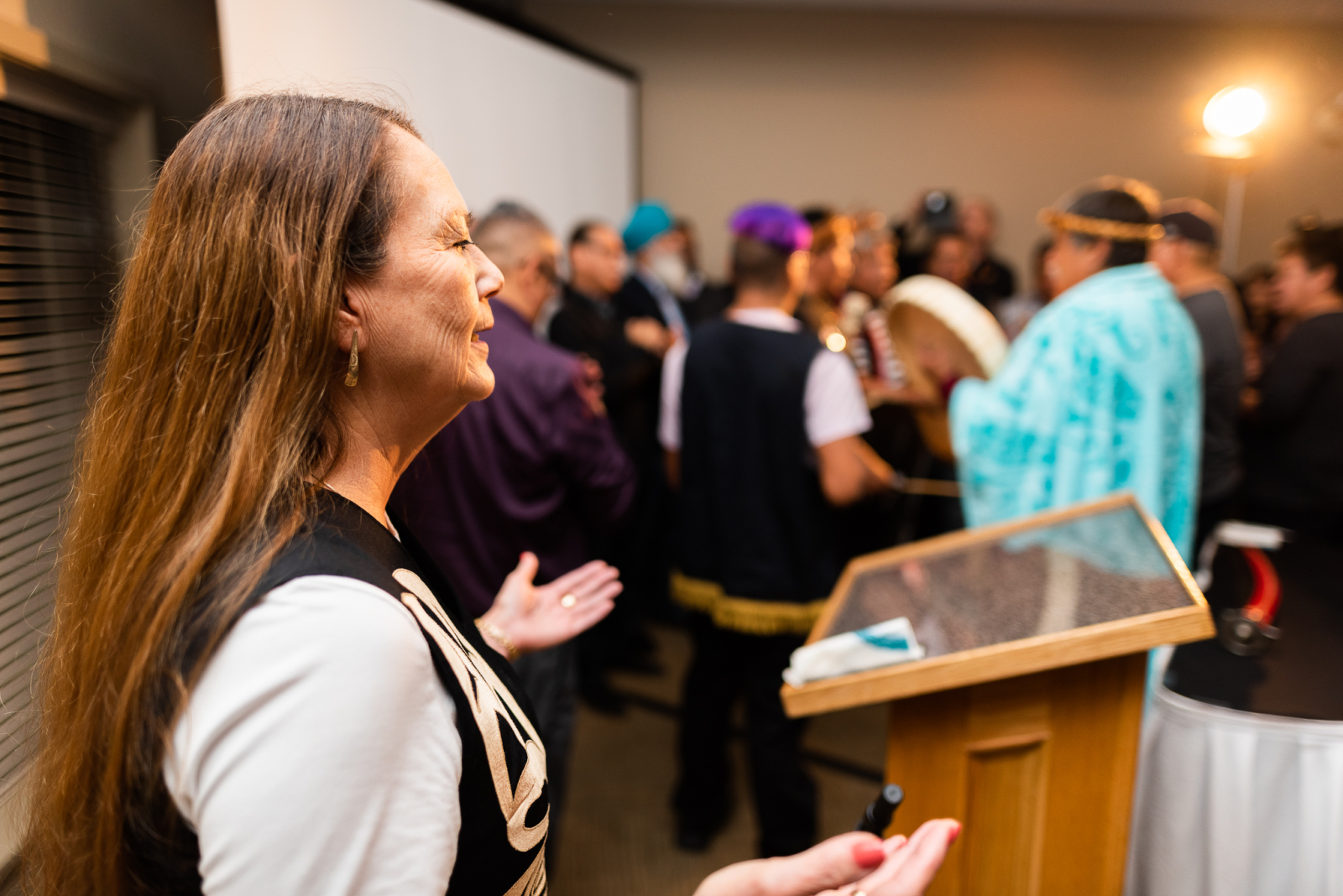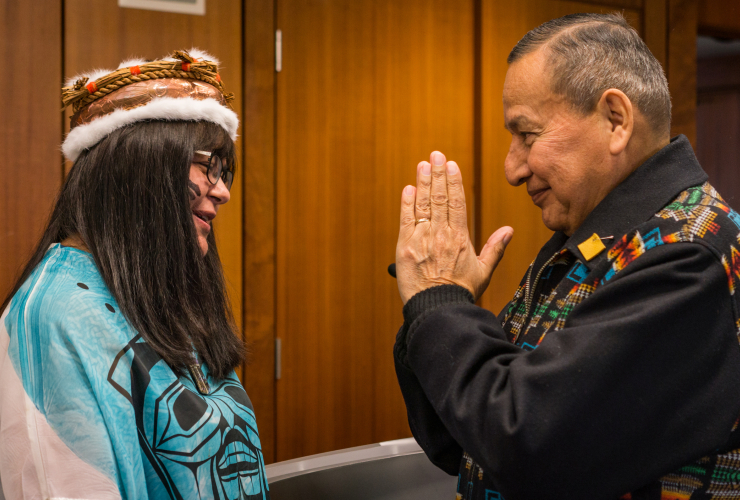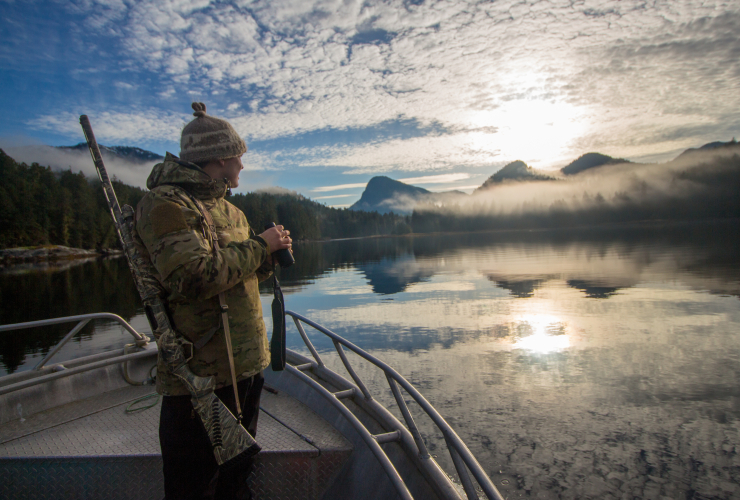Jatinder Singh never imagined that a street sign in Victoria's Cook Street village would take him on a journey that stretched back to 1864.
He certainly never imagined that curiosity about a street which reminded him of his Punjab homeland would also bring him stories of the village of Maaqtusiis (Ahousaht) on the west coast of what is now known as British Columbia, or that it would connect his Sikh community to Ahousaht today, in the spirit of meaningful reconciliation.
Sutlej Street — the name caught Singh's eye as soon as he saw it, he told National Observer in an interview on Oct. 26. Sutlej is the name of one of the five rivers of the Punjab and is associated with many historical Sikh events.
Singh is the director of Khalsa Aid Canada, a non-profit organization based on Sikh principles of selfless service and universal love. The organization recently pledged $200,000 to the Ahousaht Nation over five years and marked the occasion at a gala on Friday in Parksville, B.C.
The story of how these two communities came together involves blood, history — and a little Nuu-chah-nulth girl named Maggie Sutlej.
Tied together through blood
The Sikh Empire was powerful, Singh explained.
"When Maharajah Ranjit Singh (leader of the Sikh Empire) passed away, the empire weakened from power games within the Lahore Darbar and treachery among powerful politicians," Singh said.
"Seeing the weakness, the British increased hostilities at the Sutlej, which marked the border between the Sikh Empire and the British. After two wars, Punjab was annexed, the son of Ranjit Singh deposed, and Punjab colonized by the British."
After the British East India Company beat the Sikh Empire at the Battle of the Sutlej in 1846, the British named their ship HMS Sutlej after the bloody victory, charging it with new meaning.
Eighteen years later, after ongoing and intensified conflicts between the Ahousaht Nation and the British Kingfisher crew, Rear Admiral Joseph Denham sent the gunboat HMS Sutlej vessel to the coast. The event is still remembered today as the most aggressive gunboat attack on the West Coast. The vessels fired cannonballs, the crew burned longhouses, destroyed canoes, claimed hostages and killed many.
After what became known as the Kingfisher event, the Admiral's wife, "Mrs. Denham" found a small toddler buried underneath her dead mother. The woman took the child from the scene, brought her on board and renamed her Margrette Sutlej Davis, after the gunboat that was to become the girl's new home. The Nuu-chah-nulth girl survived only two more years, dying at sea.

According to archives from the Royal British Columbia Museum, Sutlej was "adopted" outside of her culture by the Denhams and was loved and adored while aboard the ship. She died off the coast of Chile two years after her kidnapping. Photo from the Royal B.C. Museum archives, provided by the Khalsa Aid organization.
The same warrior spirit
When Singh looked into the story of Sutlej Street, his research brought him the story of Maggie Sutlej and the Ahousaht Nation.
"It was quite sad to learn that a historic river we hold in high regard would have its name used for these atrocities," Singh wrote in an email.
"Although not considered a sacred river, it is extremely important to us. Some of our Gurus' ashes were immersed in the river, and many Sikh Gurdwaras (places of worship) dot its banks, marking historical events. The Punjab is named after the five rivers which make up the area, and the Sutlej is one of those five rivers."
Singh felt in his heart that he wanted to reach out to the Ahousaht Nation, to share the Sikh community's story of the Battle of the Sutlej and find out more about how Khalsa Aid could work together with the nation to make things right.
Khalsa Aid started in 1999, when Singh's community celebrated 300 years of the Khalsa, he wrote.
"Khalsa is the body collective of the Sikhs and means 'the Pure' or 'the Guru’s own’. In 1999, with the war in Kosovo, we decided that mere celebrations of the Khalsa were not enough. It was more important to act on the principles of the faith," Singh said.
"We sent a convoy to help Kosovan refugees and Khalsa Aid grew from there. Our motto is from our tenth Guru ‘Manas ki Jaat Sabh Ek Pechanbo – recognize the whole human race as one’."
When Singh contacted his community, he found that friends like Kamaldip Rai, had already established relationships with the Nation, working as the supervisor of the Nuuchahnulth Tribal Council Quu-asa mental health program for 18 years. Rai told Singh stories about the Ahousaht that had been shared with him, stories of the canoe-going people and their reputation of being skilled whalers and fearless warriors.
The Ahousaht Nation has been known in modern times for being the first to respond to emergencies and disasters on their lands and waters.
In 2015, community members were the first to reach and rescue terrified passengers of the capsized MV Leviathan II whale watching ship that left five dead. First responders told media at the time that the heroic efforts were "just our ways."
"Ahousaht has the same warrior spirit and work ethics as our community," Rai told National Observer over the phone. "Ahousaht people are always the first out on the water helping people out. They go out in handmade canoes and hunt whales. We can really relate with them, with their warrior spirit and peaceful spirit. We are warriors too, of the mind, the spirit and the sword."
After discussing the Sutlej connection with the community, Khalsa Aid Canada decided to take reconciliation into their own hands.
In an effort they named the Maggie Sutlej Ahousaht Project, the organization pledged $40,000 to the Ahousaht Nation every year for five years.
That's $100,000 donated from the Sangat (the Sikh community) directly to the community, intended to aid in their search and rescue efforts and youth initiatives. Singh said over the phone that Khalsa Aid does not want to control the funding in any way, but plans to hand it over to the Nation to do what they know best.
Two communities coming together
To herald the project, a gala was held Oct. 26 at Tigh-Na-Mara resort in Parksville, B.C. During the gala event, the two communities shared stories, gifts, songs and ceremony.
Chief Councilor for Ahousaht, Chief Greg Louie told National Observer in an interview that the story of Maggie Sutlej was familiar to the Nation, but they hadn't been expecting Khalsa Aid to be the community to try and make things right.
"There's so much emotion right now. Sadness, happiness, a mixture," Chief Louie said. "What we take out of these events is a new relationship, a new friendship, built by two communities."
Louie said the community plans to use the funds to support the youth, to acknowledge Maggie's short-lived life, and to support search and rescue efforts.

During the night's festivities, Ravinder Singh from Khalsa Aid International announced that their arm of the organization would match the $40,000 five-year pledge, bringing the donation to $200,000 in total.
"This is a message from my community to support First Nations," Singh announced at the gala.
"We work with refugee camps and initiatives abroad, but sometimes we overlook a need closer to home. This home here, we are guests, we are occupiers, because the land belongs to the First Nations. This isn't politically correct language, it's facts."
Singh said the relationship was a great honour for his community who have also suffered many injustices and survived great losses.
"We feel the pain," Singh said. "What brought us together is Maggie's pain. A ship used to kill so many and bring so much devastation. This reconciliation isn't empty words, it's about real support. It's the beginning of a project that will continue to grow."
"This is what reconciliation is about," Chief Louie said. "The grassroots people making connections. There are no bureaucrats, policies, procedures, or political processes in between us, we're just two groups coming together."
The Daily Colonist newspaper in 1866 recorded a "tribe of Indians at Clayoquot Sound" who traveled to Esquimalt to demand reparation for the small girl's kidnapping and death.
They demanded blankets, but the settlers didn't understand their cultural protocols at the time, The Daily Colonist reported.
To secure the Sikh community's commitment to Ahousaht, a blanketing ceremony took place (intended to uphold and protect) for hereditary chief Lewis George who bears the traditional title m̓ukʷina (Maquinna), which he received from his late father Earl Maquinna George.

Ahousaht elder Dave Frank spoke on behalf of chief Maquinna during the blanketing ceremony at the Maggie Sutlej Ahousaht Project gala on Oct. 26, 2018. Photo by Sarah Davison

Louie said he was glad government representatives attended the gala to bear witness to the events.
Indigenous Relations and Reconciliation for Mid Island-Pacific Rim Minister Scott Fraser, former Tofino town council member Gord Johns and City Councillor and Regional Director in Victoria Ben Isitt all attended the event.
In an interview before the festivities, Fraser said he was moved by the "tragic and compelling story" that connected the two communities.
"I will ensure the government makes note of the events and see we get it on the record in the legislature," he said.
When asked about Canada's most meaningful steps towards reconciliation, Fraser said he is proud of the initiative to adopt the United Nations Declaration on the Rights of Indigenous Peoples and the efforts to make the principles legally binding.
'It was magic'
Vina Robinson played a key role in connecting the two communities and making the gala event happen. When Rai told her what the Khalsa Aid had in mind, she approached chief Louie and shared the story with a group of community members who got goose bumps as soon as they heard about little Maggie and their intergenerational connection to the Sikh community.
Robinson said the only word to describe Friday night was "magic."
"We shared our culture and they shared theirs," she said over the phone. "We have been through so much turmoil in our lives and it was amazing to attend an event that was so uplifting. We started out sitting separately, but by the end of the evening, everyone was sitting together and sharing stories."
Robinson said a lot of positives steps will follow from this partnership. There was talk during the gala, of Sikh youth volunteering in Ahousaht next summer and Ahousaht youth joining Khalsa Aid on some of their humanitarian missions.
"This is the beginning of a much bigger relationship between our two Indigenous groups," she said.

Vina Robinson of Ahousaht, mental health manager of the Quu'asa Mental Health Program, dances while songs are shared at the event on Oct. 26, 2018. Photo by Sarah Davison

Kamaldip Rai's daughter Veera Rai (right) attended the Oct. 26 gala with her best friend Madison Pulford. They are both four years-old, around the same age that Maggie was when she passed away on the HMS Sutlej. Photo by Sarah Davison

Reflecting on the night's events, Rai said he was proud of the two communities for taking matters into their own hands. He said government officials have been calling him since hearing about the action taken, trying to find ways to be involved and discussing potentially contributing to donations.
"We're tired of the government doing nothing, so we're putting our own money into reconciliACTION," he said. "I think about how confused and heartbroken Maggie must have been, about the injustice of it all. We have nothing to do with that dirty legacy. Maggie prompted us to do something, Maggie opened our eyes."
Friday's event ended around 10:30 p.m., but Rai said members from his community and Ahousaht, including hereditary chief Maquinna stayed late into the night laughing and sharing stories, forging a friendship for generations to come.
An extraordinary story Emilee
An extraordinary story Emilee, just beautiful. I will never forget the Conservative federal government's response when the Truth and Reconciliation Commission released its report. Sometimes I cannot believe that we share the same country with some of these Conservatives.
Thank you for your reporting.
Thank you for your reporting. To summarize: in 1846 the British government (on behalf of their citizens) "beat" the Sikh empire in India @ SUTLEJ; named their ship after that slaughter; then, the British empire (on behalf of their citizens) use that ship to "blast" the Nuu-chah-nulth community of Ahousat with a gunboat; they take a surviving toddler (as a trophy?), name her after the admiral of that ship's wife (Maggie) and the trophy ship (Sutlej); she dies on the ship a few years later on her way to Chile? Questions: It is reported that the wife of the admiral was on the ship-or at least that she found the child under the murdered mother, can that be true? Was that wife - with her trophy child - on the ship as it plied the waters off Chile where the child is reported to have been buried at sea? Can we just pause to imagine the Nuu-chah-nulth in their 1866 appeal in Esquimalt for reparations? The Sikh community has demonstrated the extent to which our government refuses to acknowledge the past injustices against indigenous people. They have taken action to defend the name Sutlej which in actually is found on the Island as a result of a similar injustice perpetuated upon Sikh ancestors in India. This story reveals much about the values existent a mere 150 years ago on this very coast. Thanks to the Sikh community for bringing it to light.
Wonderful and spiritually
Wonderful and spiritually uplifting event. How heartwarming that this "ReconciliAction" should occur during this period of political turmoil reaching across the planet. Thank you for sharing this with us.







Comments